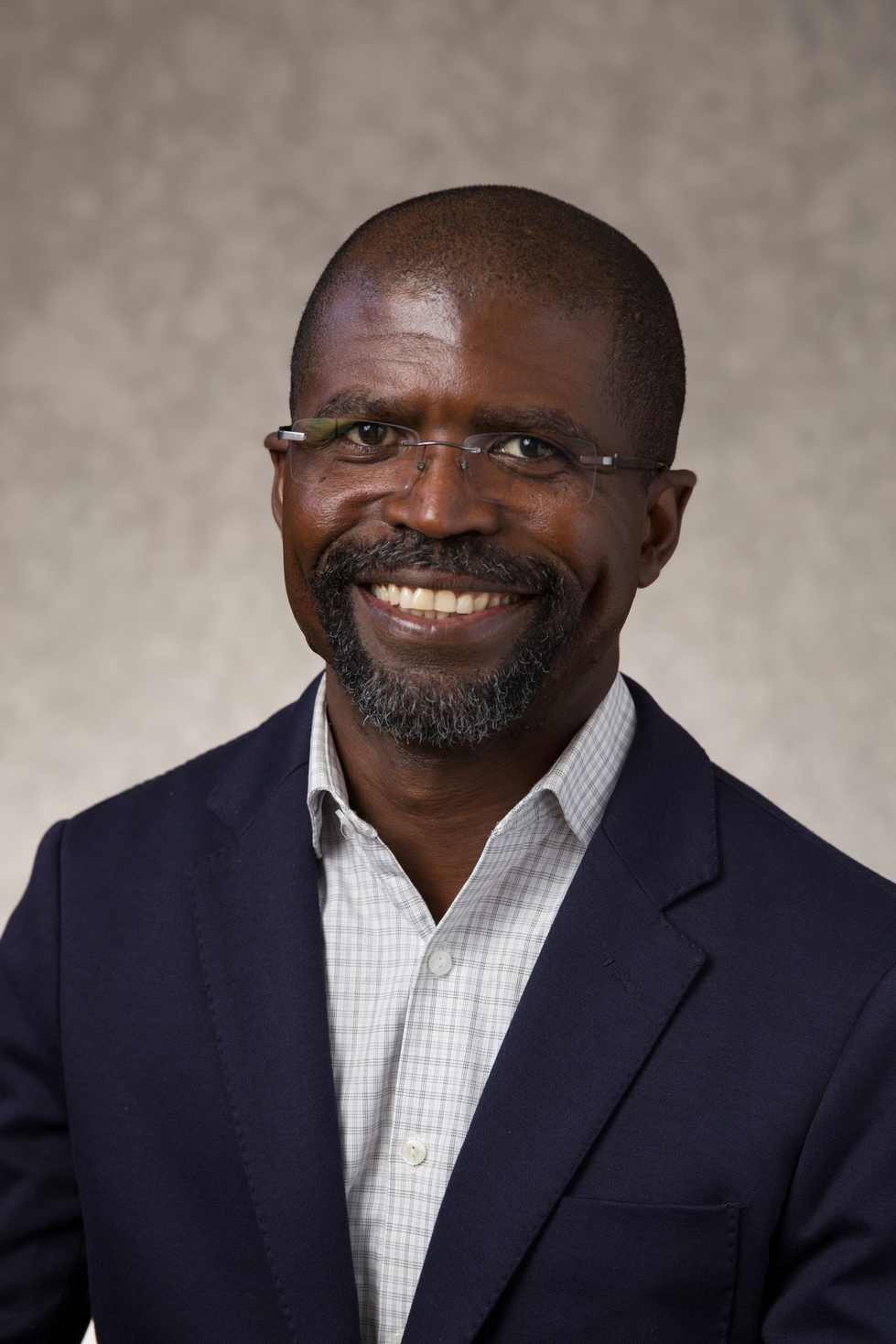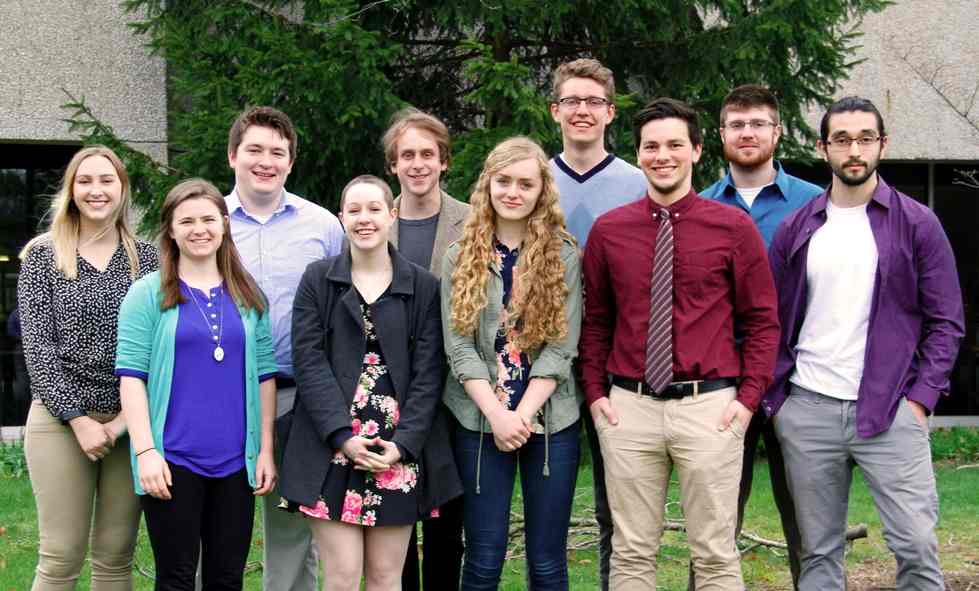Interdisciplinary Innovation
Accelerated Program for Busy Adults Graduates First Cohort
The first cohort of the liberal studies leadership program graduated in April 2016. Since it was launched in Fall 2014, the program has met the needs of working adults in an innovative way. It’s designed for working adults who have earned about 72 credits and are at least 24 years old. Students in the program, which is also offered at the Meijer Campus in Holland, take one five-week course at a time and complete an internship.
Judy Whipps, professor of liberal studies, said a community internship helps students put leadership into practice: “Leadership is both about who you are, as well as what you can do, and any leader should be knowledgeable about issues in the communities they work in.”
Grace Johnson was among the cohort of April graduates. Her role as economic development specialist for Neighborhood Ventures sprung from Johnson’s internship with the organization. While she grew up on the west side of Grand Rapids, Johnson said her internship with the West Grand Neighborhood organization taught her a lot about the area and its residents.
“I learned a ton about technical assistance that neighborhood organizations provide, and also learned the importance of walking with residents and not approaching issues with what I think would solve the problem,” she said. “Community growth and development need to come from within to be successful.”
The Holland leadership cohort was asked to connect with local nonprofits, learn about them, and offer problem-solving skills. Richard Campbell chose Disability Network-Lakeshore (DNL), a center that works to connect people with disabilities to resources and opportunities.
He then connected DNL to his colleagues at Disher Design, an engineering firm in Zeeland. Their collaboration resulted in a product that streamlines the process of installing a permanent residential wheelchair ramp.
Through meetings and conversations with DNL staff members, Campbell learned about the red tape involved with residential wheelchair ramps. He took that problem to Disher Design and worked with team members to create a 3-D computer-aided design (CAD) and blueprint of a wheelchair ramp that meets all Americans with Disabilities Act guidelines and Michigan residential building codes. Disher also reconditioned several old wheelchairs for DNL.
“The CAD model allows us to easily lay out a wheelchair ramp assisting someone with limited mobility and simplifies the process for them to acquire a building permit before installation,” Campbell said. Campbell’s involvement with DNL led its executive director to nominate him for an ability scholarship to attend the West Coast Leadership program. “None of this would be possible if I hadn’t been in Grand Valley’s leadership program,” Campbell said.
[1478011212].jpg)
Accelerated Cohort Student Voices
“ A liberal education [showed] me that it was possible to find an intersection between my passion, mission, vocation, and profession. I learned so much about the leader that I was and who I wanted to be.” —Holly Monahan
“This experience, these classes, the professors, the students, the reading material, they have changed me. I have been able to relate to, communicate with, and learn to respect people who think in ways different than my own. I have learned to find common ground and develop mutual understanding where I previously thought this impossible.” —Jill Marie Monroe
“ The interdisciplinary studies approach at GVSU, and the leadership cohort in particular, has helped me establish a solid foundation where information from multiple sources and disciplines can easily be assimilated into an articulate message using the tools of dynamic decision making and problem solving.” —Don Fare
“ I can say that at no time in my life, until now, have I experienced such a strong outward connection to the world. My studies have transformed not just my thoughts but also the way I walk through the world. My voice, along with others, can help shape our community and our world through patience, mindfulness, and thoughtful leadership.” —Grace Johnson
“ Being a nontraditional student returning to school, I believe I bring a unique perspective as a parent and someone who has built and run their own business. I have used my experiences, along with integrative studies, for tackling real-life challenges.” —Tim Woodcox
New Course in Design Thinking Helps Students Become Creative, Compassionate Problem Solvers
Students in design thinking courses worked collaboratively with stakeholders on issues that affect the campus and West Michigan communities. It was the first year Design Thinking to Meet Real-world Needs was offered. Co-taught by Linda Chamberlain and Danielle Lake, the liberal studies class provided cross-discipline students the opportunity to experience and apply the
design-thinking process within the context of the complex problems existing today.
Embedded in the university’s General Education Program, the course also emphasizes working in teams and integrating knowledge from across disciplines. This integrative interdisciplinarity is highlighted in that Chamberlain and Lake co-taught the course in its first year: Chamberlain has a Ph.D. in chemistry and has a professional background in business and product development; Lake has a Ph.D. in philosophy and practices public philosophy — engagement with the community on collective problems.
Chamberlain, who serves as the Frederik Meijer Endowed Honors Chair in Entrepreneurship and Innovation, said students gained a tool set through the class that is in high demand in any environment: “They learned the ability to collaborate on interdisciplinary teams, define a problem accurately, and provide innovative solutions.”
Lake, assistant professor of liberal studies, said during the fall semester, students worked with the student food pantry at Grand Valley to address issues of food insecurity on campus. During the winter semester, students worked with Seeds of Promise to research issues of homelessness and affordable housing in Grand Rapids.
Lake said each course begins with empathetic listening. “We begin by valuing the knowledge of our community,local experts, stakeholders, and community members experiencing real problems right now,” she said. “We do not just study these problems in our community, we study them with our community; we collaboratively design innovative prototypes aimed at better addressing issues of social justice.”
Civil Discourse Initiative Highlights Global and Local Issues Related to Immigration
The new Padnos/Sarosik Endowed Professor of Civil Discourse at Grand Valley State University brings his background in international relations and global migration to the position.
Jack Mangala was introduced as the second professor of civil discourse on November 19, 2015, at a symposium at the L.V. Eberhard Center on the Robert C. Pew Grand Rapids Campus. The endowed professorship is housed in Brooks College and was given as a gift to Grand Valley in 2013 from longtime university supporters Shelley Padnos and Carol Sarosik.
Mangala, himself an immigrant from the Democratic Republic of Congo, is an associate professor of African and African American studies and political science. He started teaching a course in the Fall 2016 semester that focuses on global migration and the challenges and opportunities immigrants and refugees present for host communities.
“The focus of the course, which fills a gap in Grand Valley’s curriculum, is to engage students in a critical understanding of the global issues impacting migration, such as poverty, human rights, conflicts and the environment,” Mangala said.
Anne L. Hiskes, dean of Brooks College, said the advisory board was drawn to Mangala’s proposal because of the current discussions about immigration and crises in the Middle East.
“The civil discourse initiative provides a professional development opportunity for Grand Valley’s faculty and enriches the curriculum,” Hiskes said. “Jack’s course on immigration and refugees will enrich Grand Valley’s curriculum and provide new opportunities for students for meaningful, community-based learning and to develop leadership skills in facilitating dialogue around difficult issues.” As a general education course, Mangala’s class is open to students of any major.
The civil discourse initiative is a catalyst for curricular innovation. Two years ago, education Professor Lisa Perhamus taught the inaugural civil discourse class, which focused on community revitalization in Detroit. The course is now a permanent offering in the General Education Program, and is cross-listed between the College of Education and the Brooks College: EDF/IDS 325 - Learning from Detroit: Education and Community Revitalization on the class schedule for Fall 2016.
Mangala said he is interested in the virtues of civil discourse in personal and public spaces, and he sees civil discourse as a critical skill for college students.
“Keeping a tradition of civil discourse, particularly when we confront complex and sensitive issues, is absolutely critical in preserving the essence of a public democratic life,” he said. “The practice of civil discourse challenges us, both as individuals and citizens, to remain true to the best of human traditions.”
He was also charged with planning a community symposium for Fall 2016. Mangala said the event’s overarching theme is to bring together stakeholders involved in immigrant and refugee integration to engage in dialogue and share strategies and experiences on how West Michigan can create welcoming communities for those populations.

A New Name and a Record-breaking Impact on Grand Valley
To recognize the contributions of the family it honors, the Padnos International Center was rededicated April 23 as the Barbara and Stuart Padnos International Center.
Mark Schaub, chief international officer, said the rededication ceremony celebrated the work of the center. Since 1999, the center had been known as the Barbara H. Padnos International Center.
The center offers more than 4,000 study abroad programs — a growing component of the center’s work — and hosted a record number of international students (434) in 2015-2016.
Grand Valley saw greater participation in numbers of students who studied abroad in 2015-2016 than in previous reporting years, thanks largely to the support of the center. Also, the Institute of International Education released its report on 2013-2014 data, which indicates Grand Valley’s 753 study abroad participants ranked it 11th among master’s degree-granting institutions in terms of number of study abroad participants. Among state institutions, Grand Valley is ranked third, following the University of Michigan and Michigan State University.
Schaub said the top three destinations for study abroad participants are the United Kingdom and Spain, with a tie for third place between Ghana and France.
Although bringing international students to campus and sending students abroad is a core component of the center’s important work for Grand Valley, it offers many other services as well, such as bringing international scholars to campus so that the campus and West Michigan communities can learn from them; sending faculty and staff members abroad to learn from their international colleagues and build additional exchange opportunities for students; assisting students and faculty members with applications for fellowships abroad; and offering expert advice and professional support to faculty and staff members who wish to internationalize the curriculum and co-curricular offerings.
An exciting new development for the center is the award of grant funds from the United States Peace Corps to hire a Grand Valley-based campus recruiter for the Peace Corps. This one-year contract is renewable for up to five years and supports the half-time position of Carissa Patrone, hired as the initial recruiter to cultivate interest among students in this meaningful work abroad. Patrone began working at Grand Valley in May 2016.
Each year, competitive scholarship programs result in significant study abroad awards for Grand Valley students. Two such programs are the Barbara H. Padnos Scholarship, which provides funding for a year-long program, and the Mark A. and Elizabeth C. Murray Scholarship, which supports students who otherwise might not be able to afford to study abroad.

